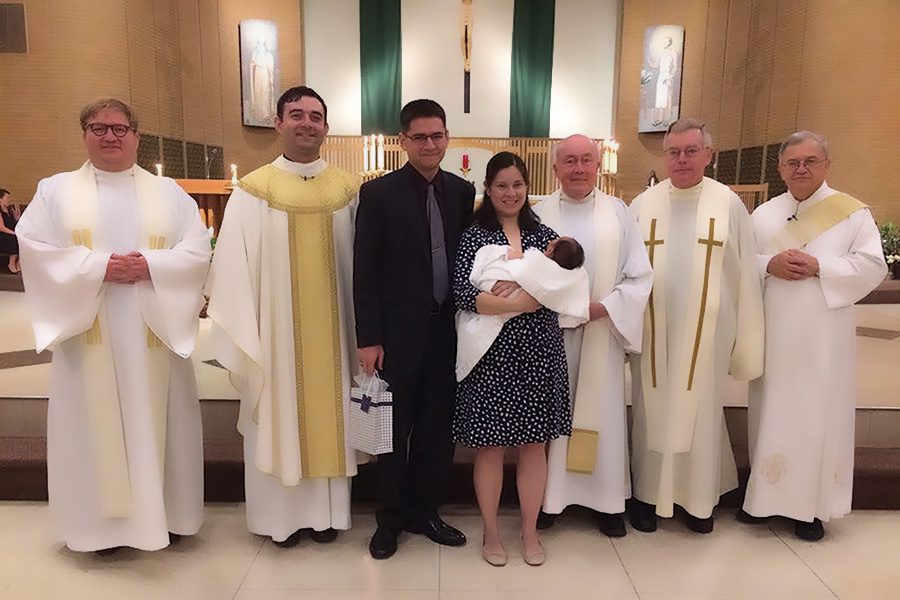An end-of-summer greeting to all of you in the Cross and Anchor Guild from Fr. Tom Zurcher, C.S.C.
Yes. Autumn is just around the corner. The football season is upon us. Some of you may have even gone to Ireland for the Notre Dame vs Navy game. Back in May, it was announced: “Aer Lingus College Football Classic Officially Sold Out.” 39,000 to 40,000 fans from the United States head to Ireland. Go Irish!
Given the context of sports in the autumn and especially football, let me share a few thoughts about Ministry from the Sidelines. Not everyone is able to do this kind of specialized ministry. Doing it well is another question.
In fact, most of us don’t want to be on the sidelines. We’d much rather be a player out there on the field. “The sideline” may be an expression that comes from sports, but it really isn’t limited to sports. It’s more than that. “The sideline” can be related to any experience that involves loss. When we retire or get replaced, or are no longer included in something or some activity, we may lose a sense of satisfaction with ourselves or what we do, as well as lose a sense of identity that comes from performing well in the arena or the field of our career and profession.
For example, when people ask us what we do, we proudly respond, “I’m the Director of Campus Ministry,” “I’m a nurse at the Urgent Care Center,” “I teach religion at the Catholic high school,” or “I’m the CEO of Robots Inc.” Being involved in a work or a business allows us to make a contribution to the world in which we live and to the wellbeing of others. Being a “player” brings us personal satisfaction. It gives meaning and purpose to life.
Then, something happens, and the ground shifts. We get laid off after working 30 years for a company. In another scenario, we get seriously injured or come down with a major health problem that keeps us from performing the job well enough to continue. Or, the business offers a retirement incentive to older employees so they’ll move on and make room for a younger hire. Suddenly, we’re no longer on the field of play. We’re sidelined.
Major Barbara Sampson from the Salvation Army wrote about her sideline experience due to aging.
“A few months ago, my husband and I attended a friend’s fiftieth birthday…. It was delightful. But the following day, my husband said, ‘Do you realize we were the oldest ones there?’
“His words stunned me. But, of course, we were! Most of the others were years younger, and all were involved in some kind of service or ministry. They were standing where I remember standing myself, so recently, but now, no longer. It was a sobering moment. There I was, a giant step away from the heart of the action, like being parked and forgotten on the outskirts of activity.” (The Salvationist: March 15, 2022)
“Being parked and forgotten on the outskirts of activity” is no easy place from which to enter into ministry, ministry from the sidelines. It requires a resilient spiritual life that embraces this very moment as the “now” of God’s presence with us. Jean Pierre Caussade, SJ, wrote that the present moment is a sacrament that both contains and conceals the Divine. “The present moment is the ambassador of God….” (Self-Abandonment to Divine Providence by Jean Pierre Caussade, SJ.)
To put it in another way, God “has nothing but gifts to offer. It remains only for us to find how even the cross can be borne as a gift.” (Constitutions of the Congregation of Holy Cross 8:118) It remains only for us to find out, when we’re parked on the sidelines, how that could possibly be a gift. The cross of being “on the outskirts of activity”, standing next to the field of play rather than on it, is a gift from which we may offer sacred gifts to others. To discern that takes a lot of prayer.
There are actually people who thrive on the sidelines. We need only look to Marcus Freeman and Niele Ivey at Notre Dame. They use the past tense to remind us that they were once stellar players on the football field and basketball court. Now they’re parked on the sidelines doing what it takes from there, and doing it well, in order to coach, to serve, to minister to the development of younger players.
A couple of years ago, I moved from full-time Holy Cross ministry in Mexico to part-time ministry at a Holy Cross parish in South Bend. In reviewing my life’s experience as a Holy Cross priest, I use the past tense like those coaches: I was a pastor, I was a director, I was a vicar. And now?
Now, I’m on the sidelines; maybe not completely on the sidelines, but almost. It’s a challenging experience for this third ager. I suggest it’s a challenging experience for any third ager.
It’s not yet possible to say that I thrive, although I do believe that God’s concealed presence is gradually being revealed in this sacramental moment. The challenge is to move from what “was” and learn how to minister anew in this “now.”
Little by little, God’s presence manifests itself in the now. There’s a renewed sense of how important it is to slow down and listen attentively as people, young and old, seek to be heard – especially the young. It manifests itself in how necessary it is to step aside a bit and observe the dynamics of life in order to discern how the Spirit is moving within us and among us – especially as the baton is passed to a younger generation. Little by little, God’s presence is revealed in this “now” moment through multiple opportunities to encourage those who are discouraged and downhearted as they give their lives to build a more just world and usher joy into a suffering humanity – stay with it, hang in there, don’t give up. To quote the Constitution again, “For the Kingdom to come in this world, disciples must have the competence to see and the courage to act.” (Constitution 2:14)
To listen to “the players” attentively, to observe and discern wisely, and to encourage those on the field of play – that describes three important aspects of sideline ministry. Of course, there are others. Doing these three well, however, is what we’re about.
At some point in each of our lives, we reach the moment when we step off the field of full-time active involvement in our life’s work and onto the sidelines. That moment serves as God’s ambassador. Believing that we can respond wholeheartedly, “Our mission is the Lord’s, and so is the strength for it. We turn to him in prayer that he will clasp us more firmly to Himself and use our hands and wits to do the work that only he can do. Then our work itself becomes a prayer: a service that speaks to the Lord who works through us.” (Constitution 2:20)
Fr. Tom Zurcher, C.S.C.
Author: Rev. Thomas K. Zurcher, C.S.C.
Published October 2023




